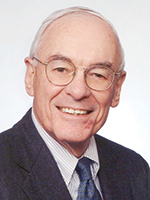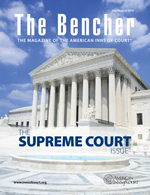Donald R. Dunner, Esquire
2016 American Inns of Court Professionalism Award for the Federal Circuit
By Jennifer J. Salopek

 Donald R. Dunner, Esquire, has been named the recipient of the 2016 American Inns of Court Professionalism Award for the Federal Circuit. The award was presented to Dunner on April 11, 2016 by Judge Timothy B. Dyk at the Federal Circuit Judicial Conference.
Donald R. Dunner, Esquire, has been named the recipient of the 2016 American Inns of Court Professionalism Award for the Federal Circuit. The award was presented to Dunner on April 11, 2016 by Judge Timothy B. Dyk at the Federal Circuit Judicial Conference.
Holding an undergraduate degree in chemical engineering, Dunner has had a long and distinguished career in intellectual property law. Not only has he developed this singular specialty over the course of his career, but he played a major part in the establishment of the Federal Circuit. He has written authoritative texts on intellectual property and is an unparalleled expert on the Federal Circuit. It was his love of argument, or at least public speaking, that drove him to law school in the first place.
The son of an optometrist and a secretary, Dunner attended one of New York City’s finest public schools, Stuyvesant High School, which prepared him well for college. Its specialized and challenging curriculum helped Dunner identify an interest in engineering and qualify for an academic scholarship to Purdue University. While there, he became interested in public speaking and student government, and was elected president of the student government. A post-graduation engineering job at a steel mill was interrupted by military service, but by then Dunner was pretty sure that engineering was not the profession for him.
“I thought that patent law, which I learned about from one of my engineering professors, would involve a perfect combination of my interests,” he says. Accepted at Georgetown University Law School, he took classes at night while working days as an examiner at the U.S. Patent & Trademark Office. When a clerkship vacancy arose in the chambers of the Chief Judge of the U.S. Court of Customs and Patent Appeals, Noble Johnson, Dunner jumped at the chance; he stayed for two years.
“It was the most wonderful education I could have gotten in the law,” he says.
Aside from the responsibility and extensive writing experience the position provided, Dunner also had the opportunity to get to know then new Judge Giles S. Rich, who became a significant mentor and friend to Dunner, an example of a work ethic that was “meticulous and methodical.”
Dunner describes the patent litigation system at the time as a “backwater,” and credits Rich, co-author of the 1952 Patent Act, with contributing significantly to the education of his colleagues in the judiciary and the patent bar by authoring tutorials in his written opinions. “Slowly but surely, his colleagues and the patent bar picked up on his teachings. He was truly a great patent lawyer and scholar.”
Other significant influences were Professor Irving Kayton, a former head of the patent law program at the George Washington University School of Law, and Professor Jim Gambrell, both of whom Dunner later partnered with on writing project in which they reviewed CCPA and other court decisions on a monthly basis. Later, Dunner authored a how-to guide to conducting appeals before the CCPA (and later the Federal Circuit).
Dunner worked for a progression of small law firms in Washington, DC, and became involved in bar association activities. He became president of the American Patent Law Association and chair of the IP Section of the American Bar Association. As a result of those activities and his scholarly output, Dunner was asked to serve as a patent consultant on the Hruska Commission, which was considering the revision of the federal court appellate system. He later served on the Carter Commission for Industrial Innovation, whose recommendation of merging the CCPA with the Court of Claims to form the Court of Appeals for the Federal Circuit was instrumental in the formation of that court.
In 1982 once the Federal Circuit came into being, Dunner served as chair of the court’s advisory committee and helped to write the rules that would govern its activities. “The creation of the Federal Circuit brought patent law into the mainstream,” he says, “as a result of which it is today one of the hot areas of legal practice.”
Over the course of his nearly six-decade career, Dunner has had significant success overturning jury and other verdicts handed down by lower district courts, and has earned the reputation of being one of the finest litigators in the country. He argued his first case before the Supreme Court of the United States in early 2014: “The justices were imposing, but I just tried to relax and enjoy it; it was among the significant experiences of my life,” he says.
Jennifer J. Salopek is a freelance writer based in McLean, Virginia.
© 2016 American Inns of Court. This article was originally published in the July/August 2016 issue of The Bencher, a bi-monthly publication of the American Inns of Court. This article, in full or in part, may not be copied, reprinted, distributed, or stored electronically in any form without the express written consent of the American Inns of Court.